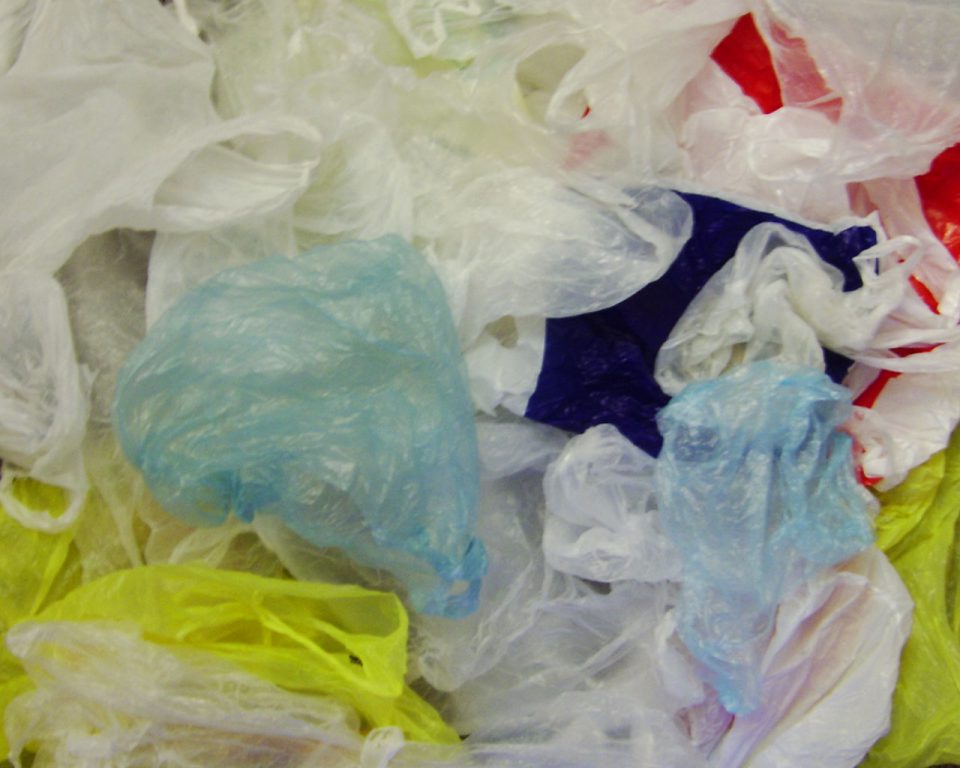Oh, Those Dreaded Plastic Bags
Council debates what to do with bags that clog up recycling process.
Plastic bags are a huge problem for anyone attempting to recycle, as Department of Public Works sanitation services manager Rick Meyers told members of the Common Council’s Public Works Committee today.
The subject arose as committee members and Meyers discussed what could be done to improve the city’s recycling program and help the environment. One thing came up over and over: plastic bags.
The bags are the bane of recycling processing centers across the globe. Whether they’re jamming up equipment or making it more difficult to sort materials, they’re a hassle to deal with and have a low resale value once they’ve been contaminated with other materials in residents’ curbside bins.
“There isn’t time to decipher and rip everything open,” said Meyers of plastic bags that come in filled with recyclable materials. “For the most part it gets picked and goes in the garbage.”
What about picking and later resorting them asked Ald. Nik Kovac? “Those that have tried it mostly regret it,” said Meyers, citing Madison as the nearest example. “You can’t produce a clean, marketable product through that curbside mix.”
“I religiously take the stuff back to Metro Market, but I know many people, they just trash the stuff,” said Ald. Robert Bauman. The alderman is right according to Meyers. The city’s recycling expert said he’s read that only two percent of the bags are ultimately recycled.
So what can be done? Kovac and Bauman suggested allowing the bags to be dropped off at city buildings or the city’s two residential waste drop off centers. “It would not be revenue neutral for us because of the logistics,” said Meyers. That could change if Kroger or another entity picked up the bags, many of which come from its stores.
“I think the best solution is to get the State of Wisconsin to ban them,” said Ald. Michael Murphy. “Even these right-wing Republicans like Robin Vos. His constituents are going to force him to start paying attention to the environment.”
But state law passed under Governor Scott Walker currently does the opposite. It prohibits municipalities from passing a ban or tax on any container.
“There is a bill introduced that would repeal that. I don’t know what its chances are,” said Meyers.
The bill, known officially as Assembly Bill 177, was introduced on April 18th. It’s sponsored in the assembly by Katrina Shankland (D-Stevens Point), Chris Taylor (D-Madison), Jill Billings (D-La Crosse), Jimmy Anderson (D-Fitchburg), David Crowley (D-Milwaukee), David Bowen (D-Milwaukee), Jodi Emerson (D-Eau Claire), Jason Fields (D-Milwaukee), Staush Gruszynski (D-Green Bay), Gary Hebl (D-Sun Praire), Deb Kolste (D-Janesville), Nick Milroy (D-South Range), Greta Neubauer (D-Racine), Tod Ohnstad (D-Kenosha), Sondy Pope (D-Mt. Horeb), Melissa Sargent (D-Madison), Christine Sinicki (D-Milwaukee), Robyn Vining (D-Wauwatosa) and JoCasta Zamarripa (D-Milwaukee).
A companion bill in the Wisconsin State Senate is sponsored by Mark Miller (D-Monona), Tim Carpenter (D-Milwaukee), Chris Larson (D-Milwaukee), Janis Ringhand (D-Evansville), Fred Risser (D-Madison), Jeff Smith (D-Eau Claire) and Lena Taylor (D-Milwaukee).
The City of Milwaukee is the only entity registered as lobbying on the bill.
And despite the long list of sponsors, not a single one is a Republican. That could be why a series of council members joked the bill might not see the light of day until 2022 or 2032.
Until then, if you want to save the city some cash, don’t throw your plastic bag in one of the city’s recycling bins. If you want to save the environment, follow the advice of council members Kovac and Cavalier Johnson and don’t get one at all.
If you think stories like this are important, become a member of Urban Milwaukee and help support real independent journalism. Plus you get some cool added benefits, all detailed here.
Political Contributions Tracker
Displaying political contributions between people mentioned in this story. Learn more.
- February 3, 2020 - Jason Fields received $50 from Tod Ohnstad
- June 3, 2019 - JoCasta Zamarripa received $100 from Christine Sinicki
- May 17, 2016 - David Crowley received $30 from Nik Kovac
- February 20, 2016 - Cavalier Johnson received $250 from Robert Bauman
- December 17, 2015 - David Crowley received $100 from David Bowen
- September 24, 2015 - David Crowley received $100 from Melissa Agard
- August 13, 2015 - Cavalier Johnson received $25 from David Crowley
- May 7, 2015 - Nik Kovac received $10 from Cavalier Johnson
























Once upon a time in a galaxy far far away, Republicans shouted from the roof tops for “local control” but now they shout “please pass the checks”!! But once more an example of a party only interested in power and responding to the cries of those with open check books! Of course no plastic bags is bad for business just ask Aldi or Costco who provide no bags …er never mind!
Could the city just ban bags altogether or tax plastic bags? Our Sendik’s gives us a nickel off when we bring in our own!!
Follow the money. The reason that the Capitol Tea Party approved a ban on local control of plastic bags was to pay back the Wisconsin Grocers Association for their genrous financial support.
In England grocers started charging customers for bags. Not an outrageous amount. The impact has been dramatic. The use of plastic bags dropped as customers became more conscientious about bringing their own bags. Currently we use those plastic grocery bags to pick up our dog’s poop. If we started having to pay a nickel a bag, we would quickly find a less expensive alternative.
Wisconsin should consider following New York State’s lead on this problem.
NY requires most larger retail stores to accept plastic bags for recycling. (Stores, like Whole Foods, which don’t offer free plastic bags are exempt from this mandate. Small stores—under 5,000 or 10,000 sq ft,—are also exempt. See link below for details.)
Not only are stores required to accept plastic bags, they are also required to actually recycle the bags and not just trash them). It works. People actually return empty bags at stores.
https://www.dec.ny.gov/chemical/50034.html